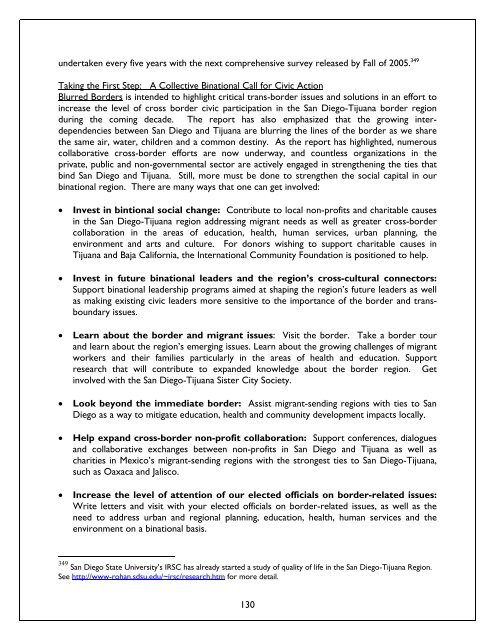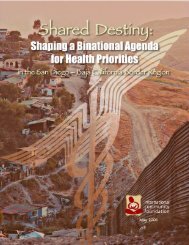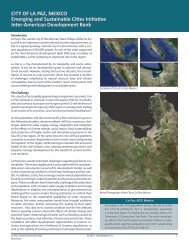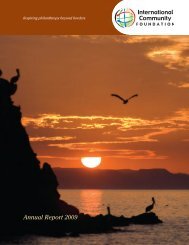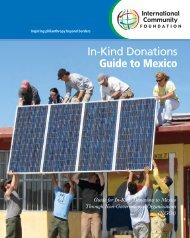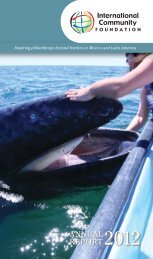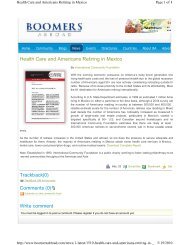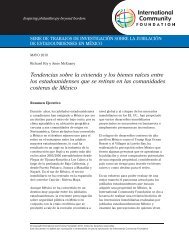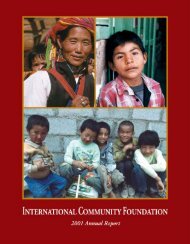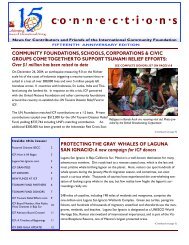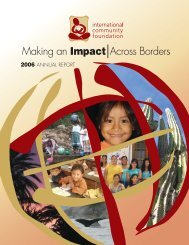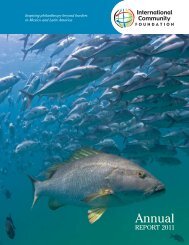Blurred Borders - International Community Foundation
Blurred Borders - International Community Foundation
Blurred Borders - International Community Foundation
You also want an ePaper? Increase the reach of your titles
YUMPU automatically turns print PDFs into web optimized ePapers that Google loves.
undertaken every five years with the next comprehensive survey released by Fall of 2005. 349<br />
Taking the First Step: A Collective Binational Call for Civic Action<br />
<strong>Blurred</strong> <strong>Borders</strong> is intended to highlight critical trans-border issues and solutions in an effort to<br />
increase the level of cross border civic participation in the San Diego-Tijuana border region<br />
during the coming decade. The report has also emphasized that the growing interdependencies<br />
between San Diego and Tijuana are blurring the lines of the border as we share<br />
the same air, water, children and a common destiny. As the report has highlighted, numerous<br />
collaborative cross-border efforts are now underway, and countless organizations in the<br />
private, public and non-governmental sector are actively engaged in strengthening the ties that<br />
bind San Diego and Tijuana. Still, more must be done to strengthen the social capital in our<br />
binational region. There are many ways that one can get involved:<br />
• Invest in bintional social change: Contribute to local non-profits and charitable causes<br />
in the San Diego-Tijuana region addressing migrant needs as well as greater cross-border<br />
collaboration in the areas of education, health, human services, urban planning, the<br />
environment and arts and culture. For donors wishing to support charitable causes in<br />
Tijuana and Baja California, the <strong>International</strong> <strong>Community</strong> <strong>Foundation</strong> is positioned to help.<br />
• Invest in future binational leaders and the region’s cross-cultural connectors:<br />
Support binational leadership programs aimed at shaping the region’s future leaders as well<br />
as making existing civic leaders more sensitive to the importance of the border and transboundary<br />
issues.<br />
• Learn about the border and migrant issues: Visit the border. Take a border tour<br />
and learn about the region’s emerging issues. Learn about the growing challenges of migrant<br />
workers and their families particularly in the areas of health and education. Support<br />
research that will contribute to expanded knowledge about the border region. Get<br />
involved with the San Diego-Tijuana Sister City Society.<br />
• Look beyond the immediate border: Assist migrant-sending regions with ties to San<br />
Diego as a way to mitigate education, health and community development impacts locally.<br />
• Help expand cross-border non-profit collaboration: Support conferences, dialogues<br />
and collaborative exchanges between non-profits in San Diego and Tijuana as well as<br />
charities in Mexico’s migrant-sending regions with the strongest ties to San Diego-Tijuana,<br />
such as Oaxaca and Jalisco.<br />
• Increase the level of attention of our elected officials on border-related issues:<br />
Write letters and visit with your elected officials on border-related issues, as well as the<br />
need to address urban and regional planning, education, health, human services and the<br />
environment on a binational basis.<br />
349 San Diego State University’s IRSC has already started a study of quality of life in the San Diego-Tijuana Region.<br />
See http://www-rohan.sdsu.edu/~irsc/research.htm for more detail.<br />
130


